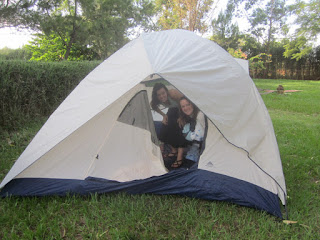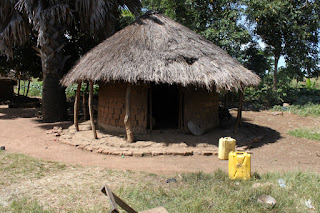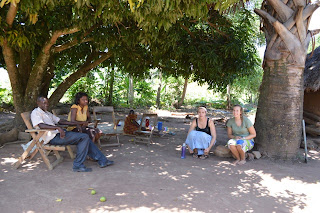Every good thing comes to an end. This is now true of the USP Fall 2012 semester. The students finished classes, took their exams, said their goodbyes and flew back to the US on December 11th. To celebrate and honor the academic accomplishments of the semester, the relationships built, and provide the opportunity to say goodbye, USP holds a farewell dinner at the end of each semester. This is a much loved and enjoyed tradition.
The evening of December 6, was the Fall 2012 Farewell Dinner. It is an important occasion as seen in the dress! Some students come in African dresses they had made in Mukono town, and others wear traditional outfits provided by their families.
The evening of December 6, was the Fall 2012 Farewell Dinner. It is an important occasion as seen in the dress! Some students come in African dresses they had made in Mukono town, and others wear traditional outfits provided by their families.
Students Rachel and Anna in traditional Ugandan gomezi.
USP student Erin with her host mother in traditional attire from western Uganda.
The evening consisted of students gathering with various people who made the semester a success; host families, practicum and social work site representatives, UCU lecturers and students,
and many of the friends that students made along the way. As a way of thanking
all of the people who attended, and as is customary in Uganda, there were a number of speeches made by various group representatives. Certificates were then given to the USP students for their completion of the Uganda Studies Program, dinner was shared and the farewell made complete with the cutting and eating of cake.


USP student, Tracie giving a speech on behalf of the Social Work students.
UCU Honors College student, Jesse giving a speech on behalf of UCU students.
USP staff member, Lisa giving a speech on behalf of the USP staff.
USP student, Allison receiving her certificate.
As part of the tradition, USP students serve the food to all the guests in attendance.
The farewell cake, being cut by all who made speeches.
As the night wrapped up, tears were shed and contact information was exchanged as the students said their farewells to those they had built relationships with in Mukono. Writing on behalf of the USP staff, I know that seeing them off at the airport in a few days will be hard because of the relationships we have also built with them. Yet we will always be connected to them because they will always be connected to Uganda. So I’ll let this blog post be a goodbye to the Fall 2012 USP students. Stay in touch and come back to visit!
Post by program assistant, Tiffany Gathers


































